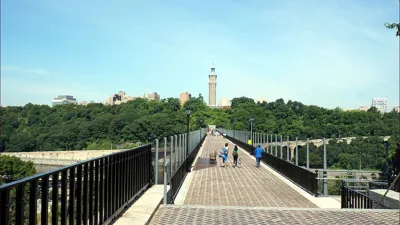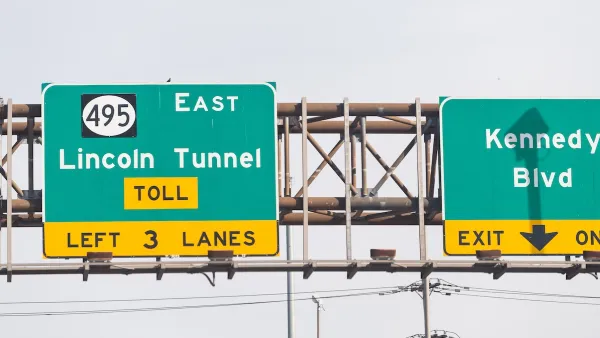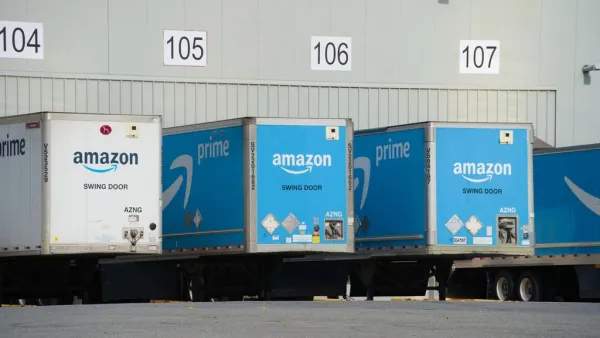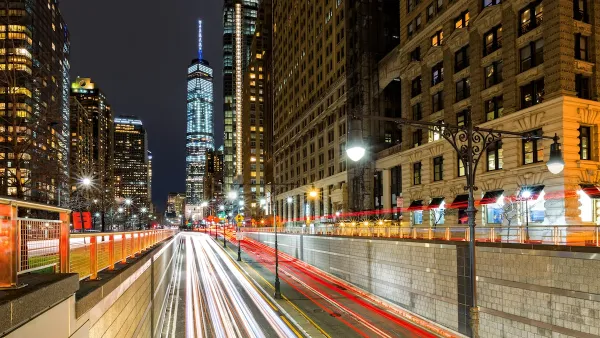Like so many other transportation policies, congestion pricing risks being sold for the wrong reasons.

Charles Komanoff, founder-director of the Carbon Tax Center, writes for Streetsblog NYC on the hot-button of topic of congestion pricing, elucidating the effects of congestion pricing relative to carbon emissions, congestion, and quality of life.
Here's how Komanoff summarizes the effect a particularly ambitious congestion pricing scheme could have on New York's emissions:
The most sweeping congestion pricing plan proposed for New York City, Move NY, will cut tailpipe emissions of carbon dioxide, the main greenhouse gas, by an estimated 950,000 metric tons a year. A little over half of that reduction, 55 percent, results from fewer auto trips from the toll disincentive along with transit improvements funded by toll revenues. The remaining 45 percent comes from smoothed traffic flow, as the lessening in stop-and-go traffic translates into better fuel economy and, thus, lower per-mile emissions.
But, according to Komanoff, "Move NY will shave just 2 percent from the total and 6 percent from the transportation part — reductions somewhere between 'modest' and 'helpful,' and well short of game-changing."
This isn't an argument against congestion pricing—instead Komanoff's argument shifts the focus to the many substantial benefits of congestion pricing that won't necessarily be measured by reduced automobile trips. While it won't stop everyone from driving, congestion pricing will make it easier for everyone to get around, writes Komanoff in a rephrasing of the "moving people, not cars" formula (recently put to the test in Virginia, to headline-friendly effect).
The true climate pay-off, according to Komanoff, is in a city that functions better and "in the thousands of households, jobs, and activities that will locate or remain in the city, rather than fleeing our crushing gridlock and dysfunctional subways for the new exurban ring or the Sunbelt or even the inner suburbs, which aren’t 'inherently green' like NYC and have carbon footprints many times larger than New Yorkers."
FULL STORY: Congestion Pricing Will Help Stop Climate Change — But Differently Than You Think

Analysis: Cybertruck Fatality Rate Far Exceeds That of Ford Pinto
The Tesla Cybertruck was recalled seven times last year.

National Parks Layoffs Will Cause Communities to Lose Billions
Thousands of essential park workers were laid off this week, just before the busy spring break season.

Retro-silient?: America’s First “Eco-burb,” The Woodlands Turns 50
A master-planned community north of Houston offers lessons on green infrastructure and resilient design, but falls short of its founder’s lofty affordability and walkability goals.

Test News Post 1
This is a summary

Analysis: Cybertruck Fatality Rate Far Exceeds That of Ford Pinto
The Tesla Cybertruck was recalled seven times last year.

Test News Headline 46
Test for the image on the front page.
Urban Design for Planners 1: Software Tools
This six-course series explores essential urban design concepts using open source software and equips planners with the tools they need to participate fully in the urban design process.
Planning for Universal Design
Learn the tools for implementing Universal Design in planning regulations.
EMC Planning Group, Inc.
Planetizen
Planetizen
Mpact (formerly Rail~Volution)
Great Falls Development Authority, Inc.
HUDs Office of Policy Development and Research
NYU Wagner Graduate School of Public Service




























